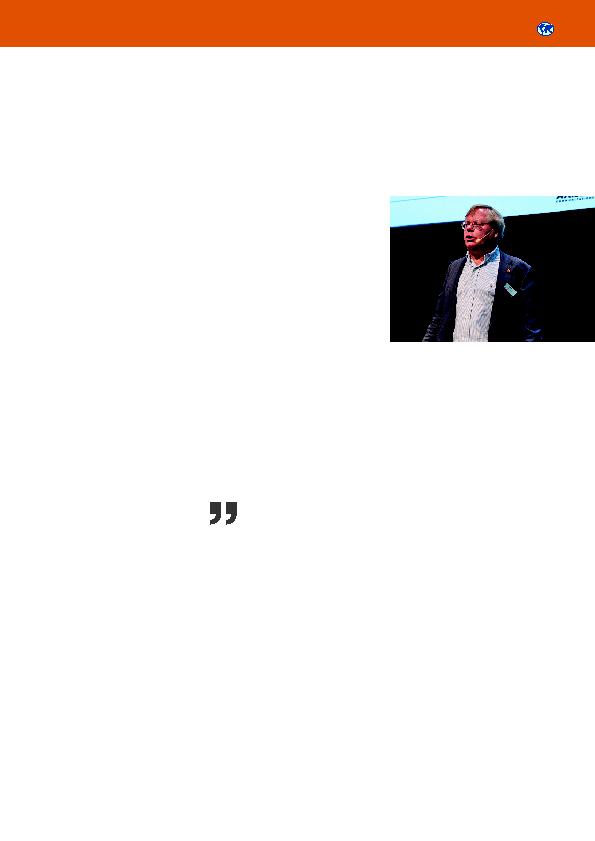
d e t e k t o r i n t e r n a t i o n a l · 4 3
"The industry has been divided
into China and non-China"
Today, Martin Gren is the Vice Chairman of
the Board at Axis AB, and he travels extensively
to visit the different security exhibitions and
Axis-offices all around the world.
For those of us on the outside, it seems like
you have quite a flexible role within the
company. What does your day-to-day work
look like?
"I see myself as the company's cultural am-
bassador. In this role, I handle onboarding for
new employees, explaining the company culture
and why it is the way it is. I also enjoy testing
our latest products, visiting our subsidiaries,
and, not least, meeting customers to see how
much they benefit from using our products. Ad-
ditionally, I'm a speaker at various trade shows
and industry events."
What general technology trends do you see in
the physical security market?
"One trend is based on geopolitics, where
the industry has been divided into China and
non-China. Then we have cloud and AI as con-
sistent elements. Regarding the cloud, I'd like
to remind you that Axis was the first to launch
a cloud video system. It was called STS at the
time and was launched back in 2005."
And Axis's relationship with AI?
"A large portion of our research and develop-
ment is focused on AI and AI-related chip
development."
Why is that important?
"Partly because it allows for much better
video analytics and the creation of metadata
streams rather than just video data, which is,
for example, important in cloud contexts. But
we also use AI to improve image analysis and
camera settings, where AI can assist in certain
situations. Ultimately, this leads to better image
quality, bandwidth savings, and easier use."
AI in five years, how will it impact security
technology?
"Five years is a short time, and there's a lot
of uncertainty to take into account, not least
concerning the effects of new legislation. We've
been actively working with AI for a long time
and see its potential, but we also see significant
challenges, such as issues related to privacy,
data, quality assurance, and ethical considera-
tions. So, giving any definite answers would be
unwise."
But surely, you can say something?
"In the short term, much of it is about bal-
ancing high expectations for AI with exploring
what the technology can and should do."
"For example, there's the eternal dream of
integrated access control, which isn't going to
happen in the next five years. Then there are
large language models, where you can ask ques-
tions in plain text to video material, but another
problem arises knowing how the data is
trained. This, in turn, requires an understanding
of all the privacy legislation."
At the recent security exhibition show
Skydd, you held a presentation about the
Internet of Security Things. What is that?
"For us at Axis, it's about IoT-connected
security devices. We were the first with net-
work cameras. After that, we developed a horn
speaker, which is also an IoT device. We also
offer network-connected intercoms, where the
Czech company 2N was the first. But since we
acquired them, we can now claim that we were
the first to launch the first network-connected
intercom."
"We also have radar and body cameras,
which are also IoT-connected security prod-
ucts."
How do you view the market for access
control?
"It's a fragmented market, marked by slow
movement, which is quite natural since you
don't change access control systems very often.
Then we have all the hackers, which is another
threat dimension related to access control."
Speaking of cyber security, more and more
laws and regulations are being introduced to
strengthen society's resilience against cyber
threats. This places ever-greater demands on
technology providers. How is the security
market affected?
"I believe it will become harder to be a small
company. You must be big enough to have
the resources for all these aspects. It's going to
create a major barrier between large and small
companies."
Do you think that laws and regulations aimed
at strengthening cyber security can contribute
to more open security systems?
"It should drive that forward. Especially in
access control, where progress has been slow
with open systems, even though there have long
been good examples at the device level. At the
system level, it doesn't exist."
Martin Gren, the co-founder of Axis is an entrepreneur who has truly
made a difference in the global market for physical security. At Skydd
he participated as a Keynote speaker and as a panelist in a special
entrepreneur panel to discuss trends in the security industry.
Detektor International has interviewed the industry icon.
Martin Gren, co-founder, Axis Communications:
Martin Gren, the co-founder of Axis is an entre-
preneur who have truly made a difference in the
global market for physical security.
Interviews with entrepreneurs
Editor: Lennart Alexandrie
I see myself as the company's cultural ambassador. In
this role, I handle onboarding for new employees, ex-
plaining the company culture and why it is the way it is."
P
hot
o
: Camill
a S
ven
s
k
